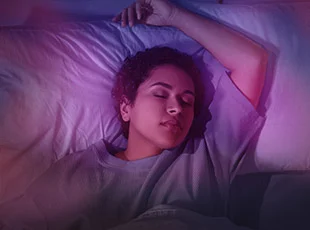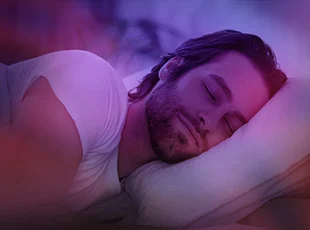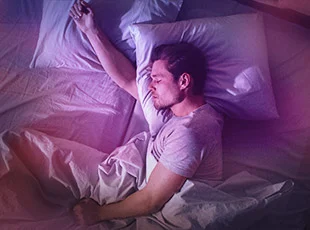If someone told you that time spent in the gym is just as important as time spent asleep, would you believe them? The truth is, sleep and exercise are both essential to the body’s overall health. While we may think of physical activity as the best thing you can do to keep your body healthy, the reality is that resting and giving your body time to reset is equally as important.
How does exercise help you sleep?
Sleep may help you feel ready to exercise, while regular exercise may support better sleep. Understanding the relationship between sleep and exercise can help you make healthier choices that improve both your sleep and your fitness level.
Trouble sleeping has been shown to be associated with lower levels of physical fitness, which is important for day-to-day activities and enjoying a high quality of life. That’s why it is so critical to do what we can to stay active.
Why does exercise help us sleep better?
Sleep, physical fitness, and overall health and well-being are intertwined. While it is critical to our health to have both good sleep habits and good exercise habits, it can be difficult to maintain physical fitness when we are sleep deprived. By prioritizing exercise and healthy sleeping habits, we can help fuel our bodies so that they can function at their optimal level, which can enable us to feel more fit, healthy, and happy.
What are the best exercises to improve sleep?
While any type of exercise may improve sleep—especially on a regular basis—research highlights specific benefits of some common types of exercises.
Cardio and resistance training. Aerobic exercise and resistance training programs have been shown to lead to improved self-rated sleep quality and faster time to fall asleep. Aerobic exercise, or cardio, encourages the body to use up more oxygen and pump blood throughout the body. It can include walking, biking, and more. Resistance training with weights improves muscle strength and endurance.
Yoga. Yoga has been shown to improve sleep and cognitive functioning. Those who start practicing yoga may increase their chances of falling asleep more quickly and sleeping for longer durations. Yoga is thought to benefit sleep through its impact on autonomic functioning and the metabolism, and by improving connections between parts of the brain.
Exercising is essential to supporting your overall health and can encourage a good night’s sleep, so the key is to exercise at the time and intensity that works best for you.
How sleep impacts fitness
Sleep affects your muscle recovery. Research has shown that sleep can play a significant role not just in overall physical fitness, but specifically in muscle strength. Studies suggest that those who experience adequate sleep and report good sleep quality are more likely to have greater muscle strength. Those who sleep fewer hours are more likely to have lower muscle strength and lower muscle mass.
It restores your energy. If your body is exhausted, you’re not going to feel motivated to exercise. Fatigue can hinder our ability to exercise after just one night of bad sleep.
It helps keep your hunger hormones in check. Sleep has been shown to affect hormone functioning, which may affect fitness. For instance, lack of sleep has been shown to increase levels of ghrelin, a hormone that triggers hunger, as well as decrease levels of leptin, a hormone that helps us feel full following a meal. We are therefore more likely to overeat when we are sleep deprived than when we have had adequate sleep. And if your body is focused on food, or busy digesting a huge meal, you won’t want to do a set of squats or jumping jacks.
It helps maintain healthy blood sugar levels. Over time, a lack of sleep may increase your blood sugar levels. This is your body’s way of fueling your daily mental and physical functions. Unfortunately, a consistent lack of sleep can make it difficult to maintain healthy blood sugar levels, leading to a number of changes in our metabolism that ultimately result in reduced physical fitness.
How sleep affects your overall health and wellbeing
Mental health. The quality of our sleep can have a major impact on our mental health and mood.1 Without proper sleep, we are more likely to be irritable and react poorly to stress. Over time, sleep deprivation can make it difficult for the brain to process stressful situations or events, impacting our mental health.1
Cognitive health.The quality of our sleep has serious implications for our cognition and attention.2 Sleep deprivation makes us less vigilant and less alert. Because sleep is required for memory consolidation, inadequate sleep can also lead to deficits in both short-term and long-term memory.2 While we sleep, the brain clears out byproducts of metabolism accumulated throughout the day.3 REM sleep also gives the brain time to remodel the parts of our brain cells that communicate with one another.4 This communication is critical for our day-to-day functioning.
Physical health.Long-term sleep deprivation leads to poorer overall health.5,6 Research shows that a lack of sleep can have a significant impact on some of our most important organs like the brain, heart, immune system, and digestive tract.5
Establishing healthy sleep habits is essential to your overall health. Promoting a healthy lifestyle and getting enough exercise goes hand-in-hand with ensuring you are not only getting enough sleep, but also getting quality sleep.
*These statements have not been evaluated by the U.S. Food and Drug Administration. This product is not intended to diagnose, treat, cure or prevent any disease.References:
- Worley SL. The Extraordinary Importance of Sleep: The Detrimental Effects of Inadequate Sleep on Health and Public Safety Drive an Explosion of Sleep Research. Pharmacy and Therapeutics. 2018;43(12):758. Accessed January 27, 2022. /pmc/articles/PMC6281147/
- Deak MC, Stickgold R. Sleep and Cognition. Wiley interdisciplinary reviews Cognitive science. 2010;1(4):491. doi:10.1002/WCS.52
- Bhat A, Pires AS, Tan V, Babu Chidambaram S, Guillemin GJ. Effects of Sleep Deprivation on the Tryptophan Metabolism. Int J Tryptophan Res. 2020;13:1178646920970902. Published 2020 Nov 23. doi:10.1177/1178646920970902
- Scammell TE, Arrigoni E, Lipton JO. Neural Circuitry of Wakefulness and Sleep. Neuron. 2017;93(4):747-765. doi:10.1016/j.neuron.2017.01.014
- & 6. Colten HR, Altevogt BM, eds. Sleep Disorders and Sleep Deprivation: An Unmet Public Health Problem. Washington, DC: National Academies Press; 2006. http://www.ncbi.nlm.nih.gov/books/NBK19960/.







